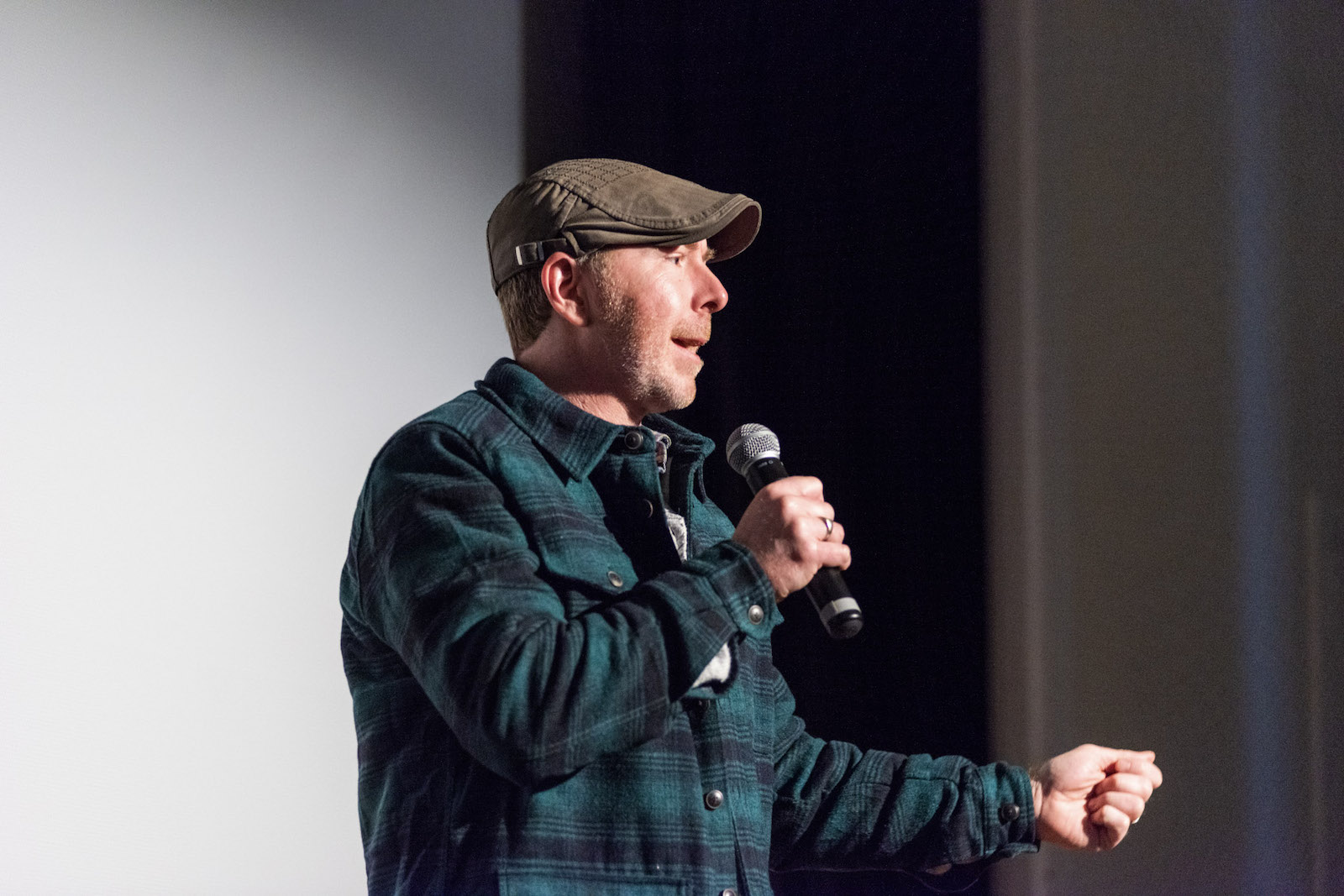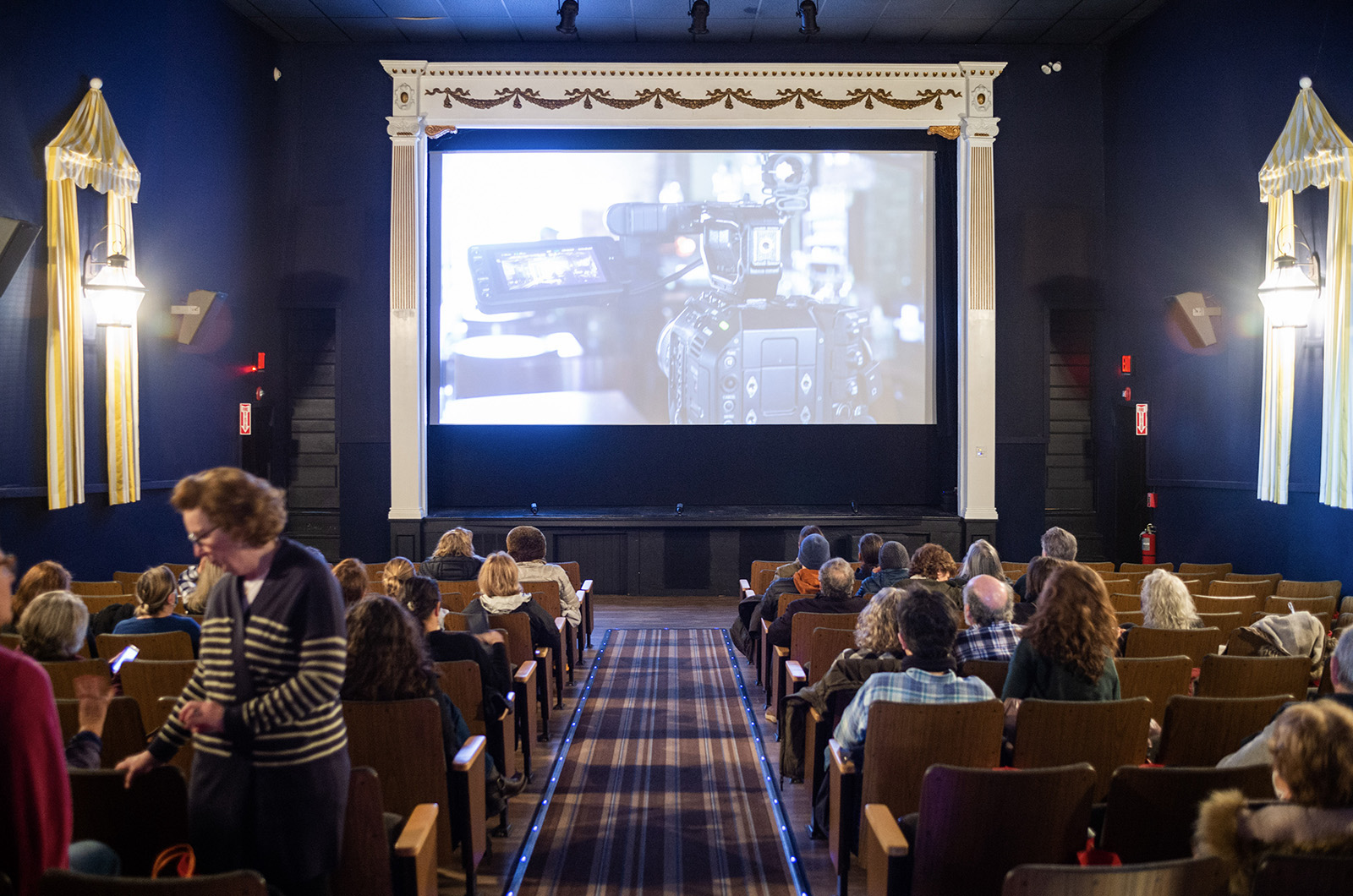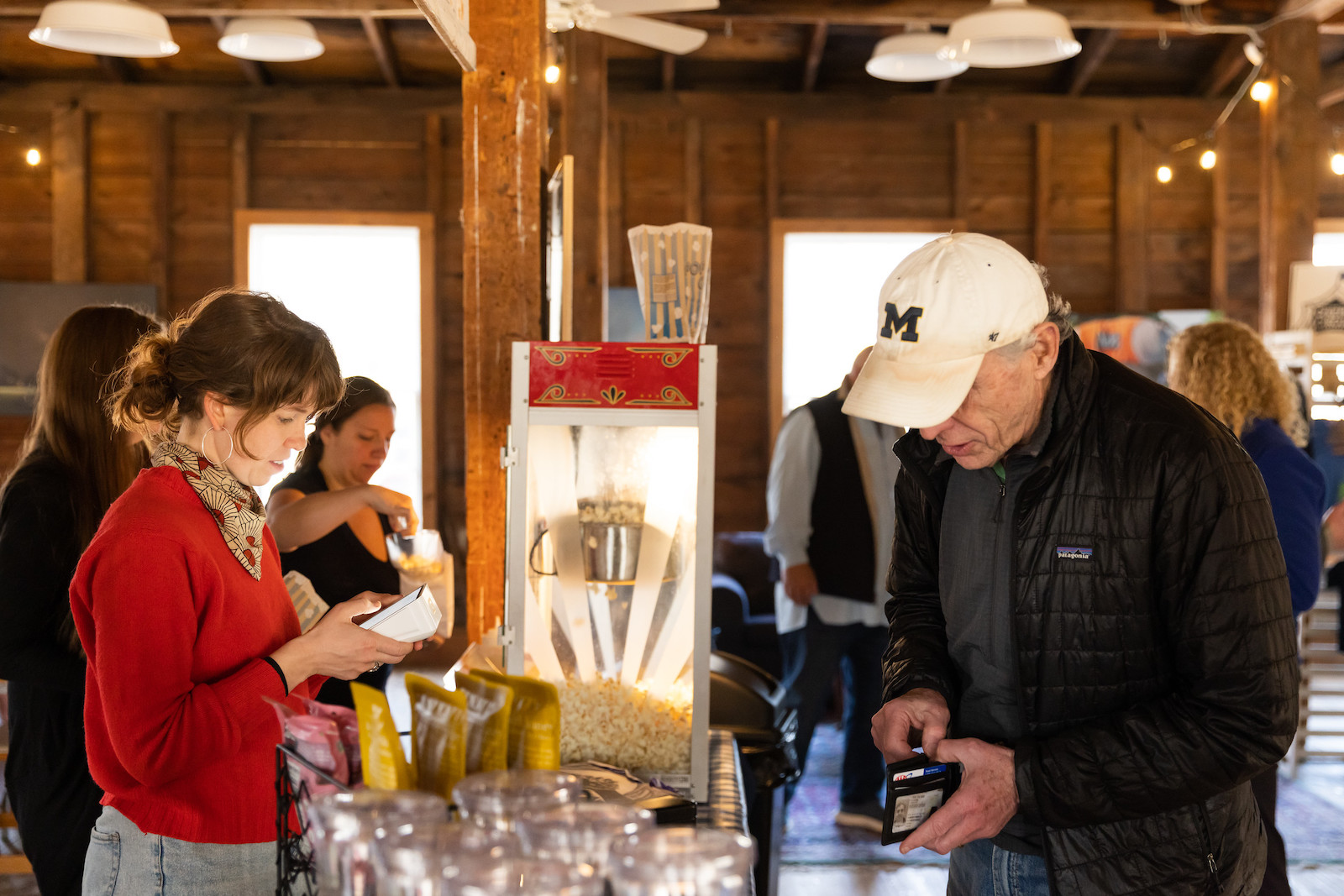The heart of West Tisbury was transformed into a movable feast of cinema for the 23rd annual Martha’s Vineyard Film Festival. For five days, audience members walked back and forth from the Grange Hall and the First Congregational Church of West Tisbury to experience over 30 films, including documentaries, features and short films from all over the world.
The Vineyard also took numerous star turns through films made by local and seasonal filmmakers or highlighting issues central to the Island.
“Almost every film has, in some way, shape or form, a connection to the Island,” said Minah Oh, director of programming for the festival.
Opening night on Wednesday featured a short documentary called Waiting to Continue: The Venezuelan Asylum Seekers on Martha’s Vineyard directed by Ollie Becker, Tom Ellis and Tim Persinko. The film told the story of the Venezuelan migrants who were sent to the Vineyard in September and the many Islanders who rose to the challenge to make them feel at home.
Four of the asylum seekers were in attendance at the screening, which showed not just their time on the Island but included clips and interviews during the harrowing journey walking from their home country to the United States.
On Friday, the festival brought the Indigo Girls to the congregational church (on-screen that is) with a documentary about the band called It’s Only Life After All. The film’s director Alexandria Bombach told the audience that the Indigo Girls had saved her life when, as a young girl at camp, she encountered their music and message of inclusivity and activism. It was a sentiment shared by many in the film.
This screenings also extended down-Island, to the 110-year-old Capawock Theatre on Vineyard Haven’s Main street.
“I really, really love the fact that we were able to bring films back to Vineyard Haven,” senior programmer and house manager Anne Evasick told the Capawock audience before showing the new documentary Judy Blume Forever.
Now 85 and a bookstore owner in Key West, Ms. Blume was a young housewife at the tail end of the 1960s when she began writing novels for children and young adults. Martha’s Vineyard makes a brief appearance in the documentary as the place Ms. Blume and her family summered for about 20 years, before she and her husband moved to Key West.
As Ms. Blume tells the story of her long career through interviews and archival footage, filmmakers Davina Pardo and Leah Wolchok also weave in colorful animations and a series of testimonials from younger authors. Film clips from the 1970s show young readers of both sexes lined up at bookstores or getting autographs from Ms. Blume, whose novels include Deenie, Forever ... and Are You There, God? It’s Me, Margaret.
The tone changes after Ronald Reagan becomes President, when Ms. Blume’s books first began to be challenged by conservative parents and others opposed to her frank approach to sexuality.
Some of the most touching scenes in Judy Blume Forever take the author to Yale University, where her archives are housed and include boxes upon boxes of correspondence with readers as young as 10. Ms. Blume always answered their letters, in some cases writing back and forth for years as the youngsters grew up. The film includes interviews with two women who first began writing Ms. Blume as girls, sharing every detail of their lives.
Ms. Blume and the filmmakers also pre-recorded a brief interview with Vineyard Haven Library children’s librarian Emily LaPierre, who expressed relief that book challenges have not been raised yet on the Island.
“I just hope it doesn’t come to you, because the censorship today is insane,” Ms. Blume said.
The festival even included a surprise mystery screening on Friday night, with audience members lining up for a sold-out show without even knowing what it would be. The film, Still: A Michael J. Fox Movie, will be officially released in May but festival-goers got an early look, with director Davis Guggenheim taking part in a discussion after the screening.

On Sunday, a trio of films at the Grange Hall took audience members on an emotional roller coaster ride, beginning with Evgeny Afineevsky’s Freedom on Fire: Ukraine’s Fight for Freedom.
The documentary, a continuation of Mr. Afineevsky’s Oscar-nominated Winter in Fire (2015), follows the past year of the war, with harrowing footage as recent as February 2023. At a post-show discussion moderated by Iya Labunka, Mr. Afineevsky emphasized that the war began well before last year, and well before American media began covering it.
“The end of my last film warned that the war had already started,” he said. “Nobody paid attention.”
Freedom on Fire placed the audience in the middle of a war zone, as Ukrainian journalists and citizens record what is taking place in their country during the Russian invasion. Live footage of missiles destroying cities and homes is interspersed with scenes of citizens trying to survive while living in basement bunkers, and children drawing pictures to be given to soldiers on the front lines.
In one scene, a seven-year-old boy named Makal shows the cameraman the remains of his apartment after a bombshell crashed through his kitchen window, leaving a crater the size of a doorway in the side of the wall.
Truth is another central theme of the film, Mr. Afineevsky said. One of the recurring narrators is the Ukrainian broadcast journalist Natalia Nagorna, a direct voice from the conflict in a media landscape obfuscated with Russian political propaganda.

Mr. Afineevsky said he hopes his film will shed light on the situation before it gets worse. Every century gets its dictator, he said to the audience, first naming Napoleon and Hitler.
“And now this century’s dictator is Putin,” he said.
The next selection in the afternoon’s lineup featured a much different tone, turning its attention to the Vineyard with a series of short films capturing aspects of Island life.
The lineup started with Deep Roots, a collection of vignettes of Island farmers filmed by Matt Taylor, who began the project right out of film school.
“I got my hands on a camera, and came back to the Island, and went to live on the old family homestead,” Mr. Taylor said, following the screening.
He was initially inspired to make a film about his grandfather, an active 90-year-old dairy farmer, however he died just two weeks before filming. Mr. Taylor adapted the project to capture a multi-generational portrait of Island farmers. On the screen Dave Flanders bailed and transported hay, Simon Athearn tapped maples and boiled syrup, and the Fischer family prepared for sheep-slaughter season.
Director Ollie Becker captured a very different Island community with his documentary on the Martha’s Vineyard Skatepark.
“It’s a blend of being a sport and an art form,” said Nick Briggs, one of the Island skater-activists featured.
The final short film of the evening was something of a departure, shot on a Japanese island halfway around the world. It was produced by Chris Fischer under the working title Fish Stories.
The Island is never named in the film, and dialogue is sparse and not translated. Instead, the visuals and sounds of work on the water speak for themselves, with wide sparse shots that capture the journey of local red snapper from boat to sushi plate.
Rye Lane closed the festival on Sunday evening, a British romantic comedy about two strangers reeling from recent breakups who meet in a public restroom.
Before the screening, Brian Ditchfield, executive director of Circuit Arts, the nonprofit that produces the festival, welcomed fellow members of the organization to the stage for a grand applause from the audience.
Mr. Ditchfield commended the Circuit Arts team for their constant dedication to the festival, and gave a specific shout out to technical director Carl Gosselin.
“If you guys knew what Carl was doing behind the scenes, it would give you sweats before every show. It’s on the phone with Disney... it’s fixing projectors at the last second. It’s really incredible,” Mr. Ditchfield said.
“I am so incredibly thankful for the whole community’s support during this festival and through the past few years and the pandemic,” Mr. Ditchfield continued. “It’s just been amazing,”
Ms. Oh also addressed the audience.
“Circuit Arts would not be what it is without your kind, inclusive, inspiring and full-of-creativity spirit,” she said. “It’s an honor to work for you, work with you and have everyone here today.”
Thomas Humphrey, Louisa Hufstader, Brooke Kushwaha and Riis Williams contributed reporting.









Comments (2)
Comments
Comment policy »